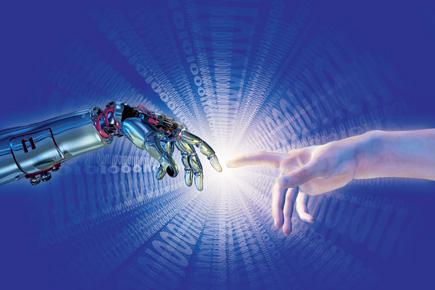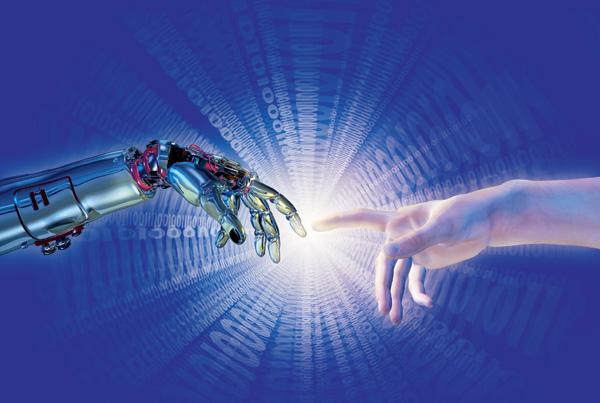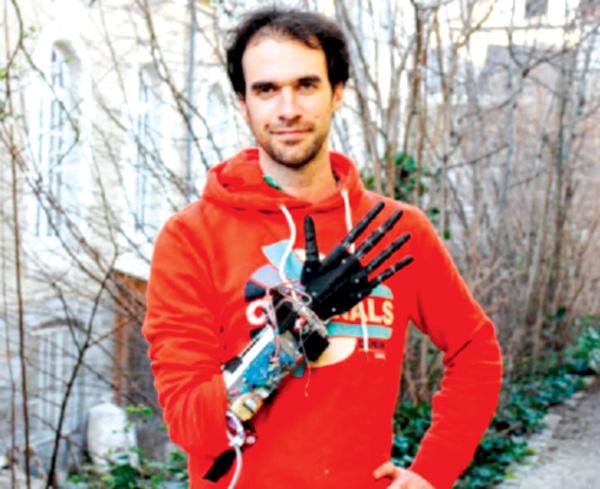In a session at Alliance Francaise, titled The Bionico Project, French engineer Nicolas Huchet will present his self-made robotic hand, based on an open source technology

robotic hand
One of the highlights at IIT’s TechFest this year was Nicolas Huchet’s robotic hand, made based on an open source technology. A decade ago, when he was working as a mechanical engineer, his forearm had to be amputated due to a work-related accident. Huchet made his own robotic hand from FabLab (a small-scale workshop offering personal digital fabrication) and conceived The Bionico Project. It is an enhanced myoelectric prosthesis, designed to help amputees regain independence in their daily lives.
ADVERTISEMENT

Representative Pic
Today, he will present and explain his project with the objective to prove that it is possible for everyone to access such technology at minimal cost thanks to collaborative, open structures like the Fabrication Laboratory (FabLab). This project brings together students, engineers, prosthetic technicians and orthopedics, centres of re-education and corporates. Over the years, Huchet has travelled across the globe to demonstrate his prosthesis. He is currently involved in sound recording. Excerpts from an interview:
Q. Tell us about The Bionico Project and the challenges you faced?
A. The Bionico Project leads to accessibility of prosthetic devices and emphasises the possibility of making it yourself.
We discovered the 3D printed open source robot called InMoov created by Gael Langevin using Arduino (open-source electronics platform). Then we integrated muscle sensors and placed them on my arm. With a bit of code in the board, I could control the robotic hand with my muscle impulses.

Nicolas Huchet with his robotic hand
It was a challenge to create a robust, easy-to-make and fix myoelectric hand (artificial limb controlled by electrical impulses) that is light and customisable, so that hand amputees can afford and want to use it.
There were several messages behind the Project: to enable everyone to have access to healthcare; make people feel responsible about what they need and to keep on learning. Nowadays, you find lots of 3D printers and cheap electronics that people can harness to learn, create and have fun.
Q. Is there sufficient awareness about prosthetics in India?
A. Amputees are suffering in India; it seems as if they are considered as beggars instead of being part of society. There is a need for greater awareness. It’s clear that if some people work together, it will change others’ lives. This change is possible and amputees must express their need (I want to walk, to drive a car, to ride my bike like everybody).
As a starting point, create a network between universities, prosthetists, NGOs like Jaipur Foot, motivated amputees and common people to drive the project. It’s what I am trying to do, and it seems as if a lot of people are ready to help in India. That is what a FabLab is made for — to connect skills and differences. It will take time, but most importantly, it is to create a new model of co-working, so it’s a win-win for everybody.
FabLab is a “maker space”, an open place where you meet different people. It is based on generosity, sharing and caring. You learn how to use a software, a 3D printer to fix your washing machine; you can also realise your project and share it to make it available worldwide.
Q. Which are the countries you have travelled to raise awareness?
I went to Italy at the Bio Robotic Institute and Maker Faire, USA, to Johns Hopkins University and to the Geek Picnic in Russia. I want to participate in worldwide research on bionic hands and share with people the many possibilities to make such products with a 3D printer, an Arduino board, cheap motors, muscle sensors and fishing lines.
I see communities around disability and 3D printing coming up (E-Nable in USA, Open Biomedicale Foundation in Italy, Can-Touch in Russia) and I am quite sure it is going to be even more revolutionary in India!
Q. What's next on your itinerary?
I will do a few more conferences in India thanks to the French Consulate of Technology in Mumbai (Pune, Goa, maybe Delhi), participate in the Quartz Festival in Goa and work on the mechanical finger with biomedical students in Mumbai. Then, I am going to settle down in France to work technically on the new prototype of the InMoov hand 2, which has all the components in miniaturise. I will also get back to my work (sound recording) and make some music.
On: Today, 6.30 pm
At: Alliance Française auditorium, New Marine Lines.
Call: 22035993
 Subscribe today by clicking the link and stay updated with the latest news!" Click here!
Subscribe today by clicking the link and stay updated with the latest news!" Click here!






